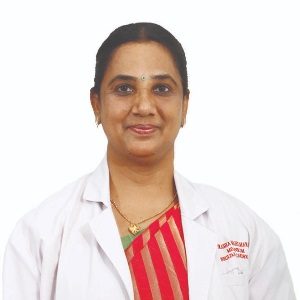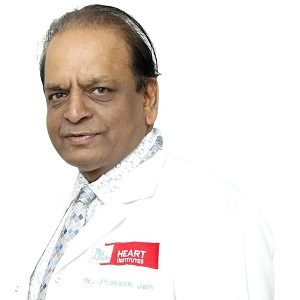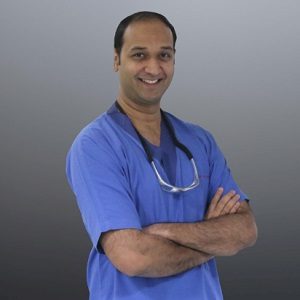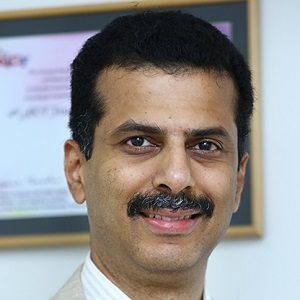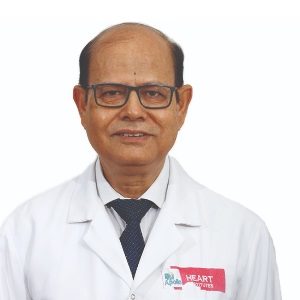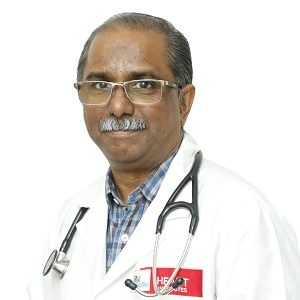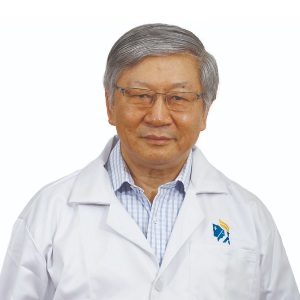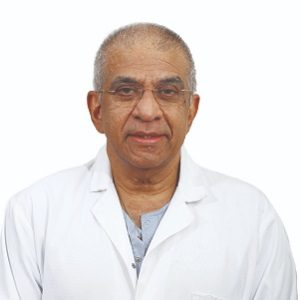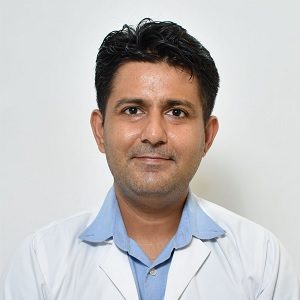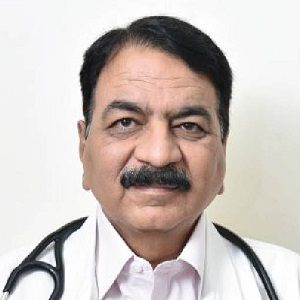Best Radiofrequency Ablation Doctors in India
- Interventional Cardiologist, Chennai, India
- Over 32 years’ experience
Profile Highlights:
- Dr. Asha Mahilmaran is a seasoned Interventional Cardiologist in Chennai, with more than three decades of expertise in the sector.
- She excelled in academics and was awarded a gold medal in medicine and cardiology.
- Dr. Mahilmaran offers Ventricular Septal Defect Surgery, Cardioversion, Carotid Artery Disease, Chest Pain Treatment, Cardiac Ablation, and Dextro-Transposition of the Great Arteries (DTGA), etc.
- Over the years, she has performed over 15,000 preventive heart checkups.
- Interventional Cardiologist, Chennai, India
- Over 25 years’ experience
Profile Highlights:
- Dr. Prakash Chand Jain is a renowned name among cardiology experts.
- Dr. Jain specializes in Transesophageal Echocardiogram, Atrial Fibrillation, Permanent Pacemaker, and Angioplasty.
- With his 25+ years of experience, he benefitted patients from counseling, diagnosis, and treatment. Some services he offers include TMT, Ambulatory BP Monitoring, MPI Test, PET scan, Valve Repair Replacement, ASD closure, etc.
- Interventional Cardiologist, Chennai, India
- Over 15 years’ experience
Profile Highlights:
- Dr. Sai Satish is an internationally celebrated young cardiologist from Tamil Nadu with expertise in the management of heart-related problems.
- With 15+ years of experience, he assisted patients with symptomatic Aortic stenosis, blood vessel blockages, and heart failure.
- He started a series of structural heart programs for those who are executing structural heart therapies and need to advance them with the best practices. The summit drew over 300 heart surgeons and 350 cardiologists.
- Interventional Cardiologist, Chennai, India
- Over 31 years’ experience
Profile Highlights:
- Dr. G Sengottuvelu is an accomplished Interventional Cardiologist in Chennai.
- He is an expert at managing complex PCI & stenting surgeries and structural heart interventions, including percutaneous heart valve replacement & repair (TAVI / TAVR, mitral clip, etc.).
- Dr. Sengottuvelu carried out around 20000 procedures in his 25 years career. He was a pioneer of the transcatheter valve program in the Apollo Group of Hospitals in 2015, performing the first TAVR.
- Cardiac Surgeon, Cardiothoracic Surgeon, Vascular Surgeon, Chennai, India
- Over 35 years’ experience
Profile Highlights:
- Dr. Dillip Kumar Mishra is a well-known and experienced Cardiothoracic Surgeon in Chennai who has completed 35 years of specialized experience.
- The doctor gained experience working overseas in countries like Italy, Saudi Arabia, Bangladesh-Dhaka, and India.
- The doctor offers the best services to the patients, some of the prominent services include Intra – Arterial Thrombolysis, Mitral/Heart Valve Replacement, Cardio-Thoracic Surgery, bypass surgery, Radial Approach Angiography Balloon Mitral Valvuloplasty, etc.
- Cardiologist, Chennai, India
- Over 23 years’ experience
Profile Highlights:
- Dr. Pramod Kumar is a leading Cardiologist in Chennai with over 23 years of expertise.
- Dr. Pramod has completed his CT coronary angio-procedures training at UCLA in Los Angeles.
- To date, Dr. Pramod Kumar has completed over 1500 TEE & 7500+ interventional cardiology surgeries with a high success rate.
- His core areas of interest include interventional cardiology echocardiography and heart failure treatment.
- Cardiologist, Chennai, India
- Over 35 years’ experience
Profile Highlights:
- Dr. Robert Mao is a renowned cardiac surgeon in Chennai having managed heart diseases for more than 35 years.
- He provides consultation and various diagnostic tests. Some procedures and tests he performs include Angiogram, Open Heart Surgery, TMT, Color Doppler ECG, Vascular Surgery, Mitral/Heart Valve Replacement Aortic Aneurysm Surgery, etc.
- Cardiac Surgeon, Cardiothoracic Surgeon, Vascular Surgeon, Chennai, India
- Over 31 years’ experience
Profile Highlights:
- Dr. Vijay Shankar S is a senior cardio-thoracic Surgeon in Chennai having experience of more than 30 years in Cardiac Surgery.
- Dr. Vijay Shankar was a fellow Coronary Artery Surgery and Congenital Heart Surgery at the University of Wisconsin, USA.
- He provides consultation and diagnostic services for Mitral/Heart Valve Replacement, Cardiac Pacing, Invasive Cardiology, ABPM, Balloon Mitral Valvuloplasty, CT Angiography, etc.
- Cardiologist, Gurugram, India
- Over 15 years’ experience
Profile Highlights:
- Dr. Anurag Passi is a young cardiologist in Gurugram and is well-known for his meticulousness, precise diagnosis, and compassionate care of patients.
- He is proficient in performing procedures like Primary Angioplasty, Transradial Intervention, Pacemaker, ICD and CRT implantation, and Complex coronary interventions (Unprotected Left Main, Bifurcation, and CTO).
- Presently, he is practicing as a Senior Consultant of Cardiology at Fortis Memorial Research Institute in Gurugram.
- Cardiologist, Gurugram, India
- Over 24 years’ experience
Profile Highlights:
- Dr. (Col) B Kalra is one of the best cardiologists in Gurugram, with nearly two decades of experience in Cardiology.
- Due to different pieces of training, Dr. Balbir Kalra has accomplished expertise in Clinical, Invasive, and Non-Invasive Cardiology.
Best Radiofrequency Ablation Hospitals in India
Radiofrequency Ablation
Radiofrequency Ablation is a minimally invasive procedure for destroying the nerve fibers that carry pain signals to your brain. It can provide relief to people who are suffering from chronic pain, especially in the lower back, neck or arthritis joints. If you are suffering from recurrent pain and you have experienced proper relief with a nerve block injection, you are likely a candidate for this procedure.
Also, termed as rhizotomy, this procedure uses heat for reducing or stopping the pain transmission. The procedure has several benefits, which include avoiding the need for surgery, immediate pain relief, very little recovery time, decreased need for pain medication, improved function as well as a quicker return to work and other activities.
Purpose
Radiofrequency ablation is able to help patients who are suffering from chronic low-back and neck pain, which is generally related to the degeneration of joints from arthritis.
The procedure is known to be quite safe and effective, with very few complications associated with it. However, the procedure is not suitable for everyone, such as people who have an active infection or bleeding problems. It is best to discuss with your doctor if you are a candidate for the procedure if you are considering it.
Preparation
Your doctor will first need to examine your medical history and previous imaging tests so that he/she can plan the best location for the ablation. If you have any questions, you should ask them to him/her.
Patients who take aspirin or a blood thinner may need to stop it for some days before the procedure is performed. It is best to discuss which medications you can stop and which ones you are able to continue.
Procedure
You will also need to take a few precautions for the treatment.
- Do not consume food within six hours of your appointment; however, you can have any clear liquids until two hours before the procedure is performed.
- If you are suffering from diabetes and use insulin, you will need to adjust the dosage of insulin on the day of your procedure. Your doctor will help you with this adjustment. Bring your diabetes medication with you so you will be able to take it after the procedure is complete. You should be able to take any other medications with a small sip of water unless your doctor recommended against taking them.
The procedure may or may not be performed using anesthesia. If anesthesia is not used, you will be awake and conscious during the procedure. First, you will need to lie on your stomach on the surgery table. If sedation is required, an IV line will be used for it.
Next, the skin over the treatment area is cleansed, so that any risk of infection is minimized. Then the physician numbs a small area of skin, by injecting a medicine for numbing the injection site.
Fluoroscopy might be used for directing the RFA needle towards the medial or lateral branch nerves. Once the needle tip is accurately placed, an active electrode is inserted through the needle. Then a small amount of electrical current is passed next to the target nerve, at a safe distance from the other nearby nerves.
After confirming the target nerve, a heat lesion is created using radiofrequency ablation. This process might be repeated for any additional nerves if required.
The procedure should not take over 90 minutes.
Aftercare & recovery
Generally, most patients are able to walk right after the procedure. After being monitored for a while, you are usually able to leave the office or hospital. You will need to book a cab or have a friend or family member drive you home.
Any pain from the procedure can last up to fourteen days, though this is generally due to the residual effects of the nerve ablation or muscle spasm. Within three days, you should be able to resume your daily activities. Though in around ten days, you should start seeing pain relief, sometimes, it might take around three weeks.
It is important for you to schedule a follow-up appointment with the doctor so that you are able to document the efficacy and address any remaining concerns that you might have for any future treatment or expectations.
Results
The pain relief should generally last from 9 months to over 2 years. If the nerve regrows through the burned lesion created by the procedure, the relief will last for 6-12 months.
If required, the procedure can be repeated.
Risks & complications
The risk of any complications from this procedure is generally low. Though infection and bleeding at the incision site are a possibility in some cases, they are quite uncommon.
Temporary side effects can include:
- Bruising and swelling at your incision site
- Weakness or numbness in the legs

